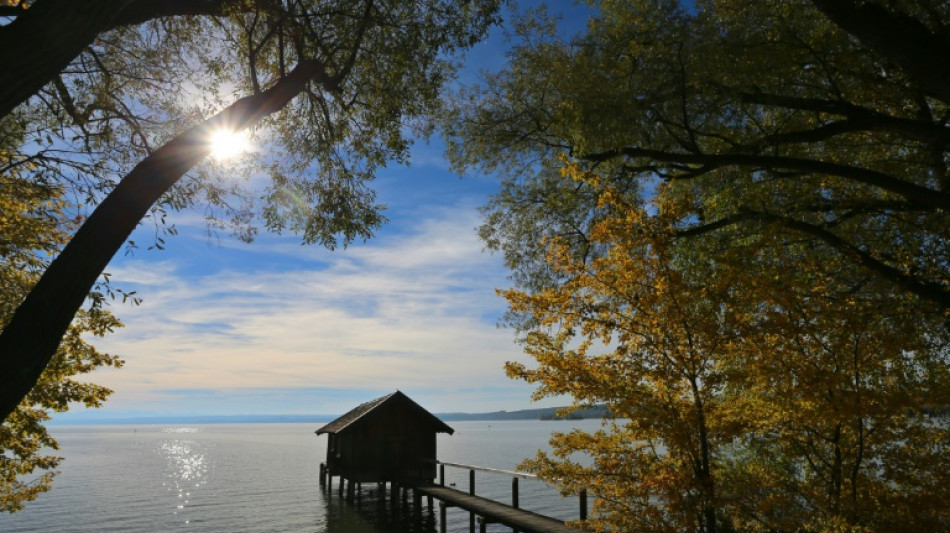
-
 Emery riled by 'unfair' VAR call as Villa's title hopes fade
Emery riled by 'unfair' VAR call as Villa's title hopes fade
-
Guirassy double helps Dortmund move six points behind Bayern

-
 Nigeria's president pays tribute to Fela Kuti after Grammys Award
Nigeria's president pays tribute to Fela Kuti after Grammys Award
-
Inter eight clear after win at Cremonese marred by fans' flare flinging

-
 England underline World Cup
credentials with series win over Sri Lanka
England underline World Cup
credentials with series win over Sri Lanka
-
Guirassy brace helps Dortmund move six behind Bayern

-
 Man City held by Solanke stunner, Sesko delivers 'best feeling' for Man Utd
Man City held by Solanke stunner, Sesko delivers 'best feeling' for Man Utd
-
'Send Help' debuts atop N.America box office

-
 Ukraine war talks delayed to Wednesday, says Zelensky
Ukraine war talks delayed to Wednesday, says Zelensky
-
Iguanas fall from trees in Florida as icy weather bites southern US

-
 Carrick revels in 'best feeling' after Man Utd leave it late
Carrick revels in 'best feeling' after Man Utd leave it late
-
Olympic chiefs admit 'still work to do' on main ice hockey venue

-
 Pope says Winter Olympics 'rekindle hope' for world peace
Pope says Winter Olympics 'rekindle hope' for world peace
-
Last-gasp Demirovic strike sends Stuttgart fourth

-
 Sesko strikes to rescue Man Utd, Villa beaten by Brentford
Sesko strikes to rescue Man Utd, Villa beaten by Brentford
-
'At least 200' feared dead in DR Congo landslide: government

-
 Coventry says 'sad' about ICE, Wasserman 'distractions' before Olympics
Coventry says 'sad' about ICE, Wasserman 'distractions' before Olympics
-
In-form Lyon make it 10 wins in a row

-
 Man Utd strike late as Carrick extends perfect start in Fulham thriller
Man Utd strike late as Carrick extends perfect start in Fulham thriller
-
Van der Poel romps to record eighth cyclo-cross world title

-
 Mbappe penalty earns Real Madrid late win over nine-man Rayo
Mbappe penalty earns Real Madrid late win over nine-man Rayo
-
Resurgent Pakistan seal T20 sweep of Australia

-
 Fiji top sevens standings after comeback win in Singapore
Fiji top sevens standings after comeback win in Singapore
-
Alcaraz sweeps past Djokovic to win 'dream' Australian Open

-
 Death toll from Swiss New Year bar fire rises to 41
Death toll from Swiss New Year bar fire rises to 41
-
Alcaraz says Nadal inspired him to 'special' Australian Open title

-
 Pakistan seeks out perpetrators after deadly separatist attacks
Pakistan seeks out perpetrators after deadly separatist attacks
-
Ukraine war talks delayed to Wednesday, Zelensky says

-
 Djokovic says 'been a great ride' after Melbourne final loss
Djokovic says 'been a great ride' after Melbourne final loss
-
Von Allmen storms to downhill win in final Olympic tune-up

-
 Carlos Alcaraz: tennis history-maker with shades of Federer
Carlos Alcaraz: tennis history-maker with shades of Federer
-
Alcaraz sweeps past Djokovic to win maiden Australian Open title

-
 Israel says partially reopening Gaza's Rafah crossing
Israel says partially reopening Gaza's Rafah crossing
-
French IT giant Capgemini to sell US subsidiary after row over ICE links

-
 Iran's Khamenei likens protests to 'coup', warns of regional war
Iran's Khamenei likens protests to 'coup', warns of regional war
-
New Epstein accuser claims sexual encounter with ex-prince Andrew: report

-
 Italy's extrovert Olympic icon Alberto Tomba insists he is 'shy guy'
Italy's extrovert Olympic icon Alberto Tomba insists he is 'shy guy'
-
Chloe Kim goes for unprecedented snowboard halfpipe Olympic treble

-
 Pakistan combing for perpetrators after deadly separatist attacks
Pakistan combing for perpetrators after deadly separatist attacks
-
Israel partially reopens Gaza's Rafah crossing

-
 Iran declares European armies 'terrorist groups' after IRGC designation
Iran declares European armies 'terrorist groups' after IRGC designation
-
Snowstorm disrupts travel in southern US as blast of icy weather widens

-
 Denmark's Andresen swoops to win Cadel Evans Road Race
Denmark's Andresen swoops to win Cadel Evans Road Race
-
Volkanovski beats Lopes in rematch to defend UFC featherweight title

-
 Sea of colour as Malaysia's Hindus mark Thaipusam with piercings and prayer
Sea of colour as Malaysia's Hindus mark Thaipusam with piercings and prayer
-
Exiled Tibetans choose leaders for lost homeland

-
 Afghan returnees in Bamiyan struggle despite new homes
Afghan returnees in Bamiyan struggle despite new homes
-
Mired in economic trouble, Bangladesh pins hopes on election boost

-
 Chinese cash in jewellery at automated gold recyclers as prices soar
Chinese cash in jewellery at automated gold recyclers as prices soar
-
Israel to partially reopen Gaza's Rafah crossing


Just looking at images of nature can relieve pain, study finds
Simply looking at nature -- or even just digital pictures of it -- can relieve pain, according to new research which scanned the brains of people receiving electrical shocks.
Nature's many health benefits has been documented by decades of research.
More than 40 years ago, a pioneering study showed that hospitalised patients needed fewer painkillers and recovered quicker when they looked out of a window onto green space rather than a brick wall.
"Yet until now, the underlying reasons for this effect were unclear," said Maximilian Steininger, a neuroscientist at the University of Vienna and lead author of a study published in Nature Communications on Thursday.
The problem is that both nature and pain can be subjective.
Because people like nature, it could have a placebo effect. Or what if it is not nature that reduces pain, but city life that increases it?
To find out more, the researchers recorded the brain activity of 49 volunteers using functional magnetic resonance imaging (fRMI).
The subjects looked at different images while receiving a series of electric shocks -- some more painful than others -- on the back of their left hand.
The first scene depicted a lake surrounded by trees blowing in the wind, while the sounds of rustling leaves and birdsong played in the background.
In the second scene, some urban elements such as buildings, benches and alleyways were added, while city noise intruded.
The third scene was of an office, with the accompanying drab furniture and whir of work.
- 'Important practical implications' -
Not only did the participants report feeling less pain when they looking at the natural landscapes, the fMRI scans showed there was a difference in their brains.
"Our study is the first to provide evidence from brain scans that this isn't just a placebo effect," Steininger said in a statement.
The nature scenes provoked decreased activity in a part of the brain involved in perceiving pain, called nociception. However other areas linked to regulating pain were not significantly affected.
The researchers said the results could be because natural environments capture people's attention, diverting them away from the sensation of pain.
This is known in psychology as the "attention restoration theory".
"The fact that this pain-relieving effect can be achieved through a virtual nature exposure which is easy to administer has important practical implications," said study co-author Alex Smalley from the UK's Exeter University.
It also "opens new avenues for research to better understand how nature impacts our minds," he added.
I.Meyer--BTB



